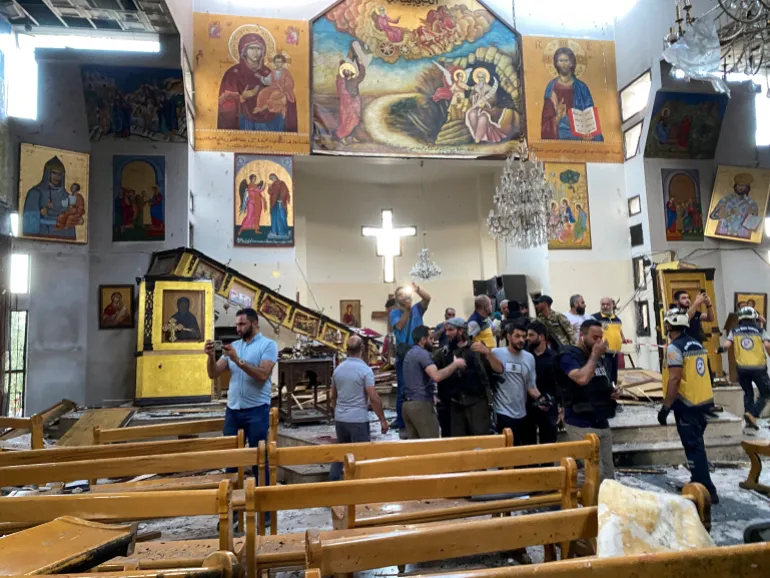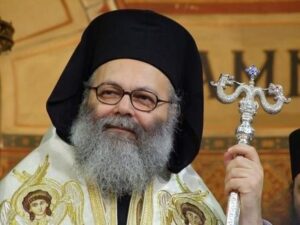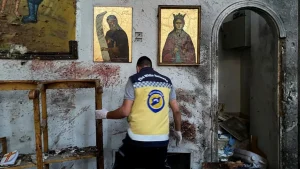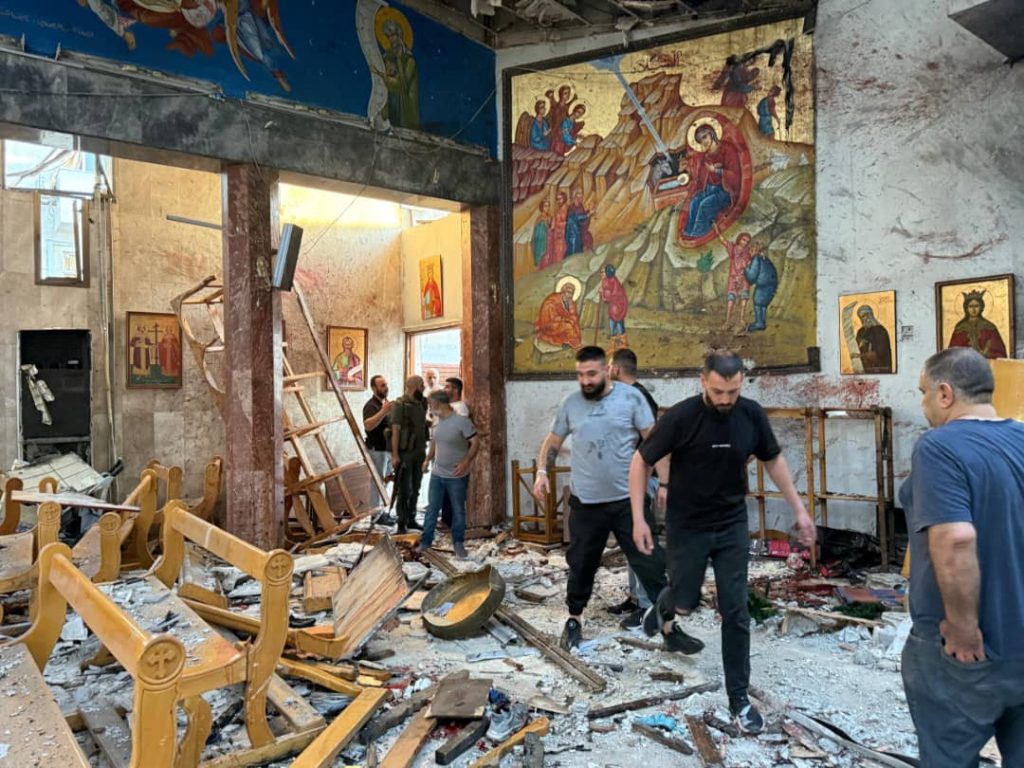
Aftermath of Church Bombing – Mar Elias Church 22 June 2025 [Source: Al Jazeera]
We read in Acts 13 that it was in Antioch that Paul received his missionary calling.
Now in the church at Antioch there were prophets and teachers, Barnabas, Simeon who was called Niger, Lucius of Cyre′ne, Man′a-en a member of the court of Herod the tetrarch, and Saul. While they were worshiping the Lord and fasting, the Holy Spirit said, “Set apart for me Barnabas and Saul for the work to which I have called them.” Then after fasting and praying they laid their hands on them and sent them off. (Acts 13:1-3, RSV; emphases added)
When Paul completed his missionary journeys, he would return to his home church in Antioch (Acts 15:24-28, 18:22). The Apostle Paul spent quite a bit of time teaching and preaching in Antioch (Acts 15:35). He was not a wondering itinerant preacher but a well-established church leader.
Antioch was a major center of early Christianity. Luke notes in Acts 11 that it was in Antioch that the name “Christians” was first given to Jesus’ followers. Antioch’s importance would extend well beyond the book of Acts. One well known Apostolic Father, Ignatius of Antioch, happened to be the third (second) bishop of Antioch. (See Eusebius’ Church History, Book 3, Chapter 22.) Antioch’s prominence was such that by the time of the Second Ecumenical Council (Canon II, Constantinople I, 381) it was recognized as one of the leading patriarchates. Antioch was also the birthplace of one of Christianity’s greatest preachers, John Chrysostom.
It may come as a surprise to many that the Apostle Paul’s home church has a historical continuity that stretches from the book of Acts to the present day. This continuity can be seen in the Patriarchate of Antioch’s listing of the succession of bishops from the Apostle Peter. to current Patriarch John X. In the 1300s, the Patriarchate was relocated from Antioch to Damascus but retained its historic title. So, it can be said that Paul’s home church is still with us to this day.
The Bombing of Mar Elias Church

John X – Patriarch of Antioch
On Sunday, 22 June 2025, a suicide bomber carried out a horrific attack on Mar Elias Church, located on the outskirts of Damascus, during the Liturgy. Initial estimates put the death toll at 22 dead and some 63 injured (Al Jazeera). For the Orthodox faithful gathered at Mar Elias Church, that morning was seemingly just another Sunday morning, and yet it would become the day of their martyrdom. Patriarch John X issued a statement which contains the following:
We offer our prayers for the repose of the souls of the martyrs, for the healing of the wounded, and for the consolation of our grieving faithful. We reaffirm our unwavering commitment to our faith and, through that steadfastness, our rejection of all fear and intimidation. We beseech Christ our God to guide the ship of our salvation through the storms of this world, He who is blessed forever. [Emphasis added.]

The Blood of the Martyrs [Source: BBC News]
True martyrdom—laying down one’s life for Christ—is not a tragedy but a grace bestowed by God. The word “martyr” comes from the Greek word for “witness.” A true Christian martyr is not someone who recklessly puts their life in harm’s way, but rather bears witness to Jesus Christ throughout life in ordinary times as well under the threat of persecution. The parishioners at Mar Elias church were bearing witness to their faith in Christ as they had for so many Sundays previously, not knowing that on that day they would receive the crown of martyrdom.
The early Church was well acquainted with violent persecution. The early Christian writer Tertullian coined the famous saying: “The blood of Christians is seed.” (Apology Ch. 50; ANF Vol. 3, p. 55) The point is that persecution of Christians contributes to the spread of the Gospel of Christ. The Orthodox Church has survived numerous waves of persecution over the past two thousand years and will endure the current wave of persecution by extremist Islamists. The victory of the martyrs is grounded in Christ’s victory over death. We read in the book of Revelation that the “weak” martyrs were able to defeat the demonic powers of the Roman Empire through Christ’s death on the Cross and by their steadfast faith in Christ:
And they have conquered him [Satan] by the blood of the Lamb and by the word of their testimony, for they loved not their lives even unto death. Rejoice then, O heaven and you that dwell therein! (Revelation 12:11)
The martyrs of Mar Elias Antiochian Orthodox Church are a reminder that even an “ordinary” event like going to the Sunday Liturgy can be a witness to the Christian Faith. They are not gone but rather have gone ahead of us. At this moment, they are standing before the throne of God. We read in the book of Revelation that the martyrs stand before the throne of God interceding on our behalf (Rev. 6:9-10, 7:3-4). In the book of Hebrews, we learn that we are surrounded by a great cloud of martyrs (witnesses) (Hebrews 12:1). In light of the recent tragedy in Damascus, Orthodox Christians not only pray for the souls of the martyrs, but we also ask their prayers as well. Holy Martyrs of Damascus pray for us!
The Christian Response to Persecution
If the Apostle Paul were with us today, my guess is that he would be painfully reminded of the time when he was Saul, the zealous persecutor of the Church. Today, there are extremist Muslims, who like Saul seek the eradication of Christianity. The Christian response is to pray for those who persecute us. Jesus in the Sermon on the Mount taught:
You have heard that it was said, ‘You shall love your neighbor and hate your enemy.’ But I say to you, Love your enemies and pray for those who persecute you . . . . (Matthew 5:43-44; RSV)
The Apostle Paul echoed Christ’s teaching in Romans:
Bless those who persecute you; bless and do not curse them. (Romans 12:14; RSV)
Let us remember that formerly Paul (Saul) was a persecutor of the Church. It was by the grace of God that he came to faith in Jesus Christ and so became the Apostle Paul. Let us therefore remember the Muslim terrorists in our prayers, praying for their coming to know Jesus Christ as their God and Savior and their becoming bearers of the Good News of Christ like Paul.

Bombed Church – Damascus 2025 [Source]
An Evangelical reader might be surprised to see that the church where the bombing occurred does not have four bare walls like so many Protestant churches, but has images on its walls. This raises the question whether the early Church was Protestant or more like Eastern Orthodoxy. The Orthodox would respond that the use of images in places of worship can be found in the Old Testament, e.g., Moses’ Tabernacle and Solomon’s Temple. And that there is evidence that the early Christians used images in their places of worship. Archaeologists found images on the wall of a church in Dura-Europos, dating back to 257 CE, located in Syria. Churches with four bare walls are largely a Protestant and Evangelical innovation. Orthodoxy claims that ancient Christianity did not disappear but continued on through the Orthodox Church, which has kept the Apostolic faith and worship to the present day. Quite possibly, the Apostle Paul might feel at home if he were to walk into Mar Elias church today.
Robert Arakaki
References
Al Jazeera. “Syria church bombing kills 25, dozens wounded.” Al Jazeera 22 June 2025.
Antiochian Orthodox Christian Archdiocese of North America. “Attack on St. Elias Church of Dweilaa, Damascus.” Church News: Antiochian Orthodox Christian Archdiocese of North America, 22 June 2025.
“The Patriarchate of Antioch: Founded by Saints Peter and Paul.” Saint George Orthodox Christian Church (Kearney, Nebraska).
“Canon II” Constantinople 1 (381). Early Church Texts.
Robert Arakaki. ”Early Jewish Attitudes Toward Images.” OrthodoxBridge.com 29 July 2013.
Robert Arakaki. “Christian Images Before Constantine.” OrthodoxBridge.com 20 August 2013.
Robert Arakaki. “The Biblical Basis for Icons.” OrthodoxBridge.com 12 July 2011.
Eusebius. Church History. Book 3. NewAdvent.org
David Gritten. “Suicide Bombing at Damascus Church Kills 25, Syrian Authorities Say.” BBC News, 22 June 2025.
Patristix. YouTube video: “Ignatius of Antioch” [4:27]
Nathan Steinmeyer. “Is the Oldest House Church in Dura-Europos?” Biblical Archaeology Society, 16 August 2024.
Tertullian. “Apology.” Ante-Nicene Fathers vol. 3, ch. 50, p. 55)
Recent Comments